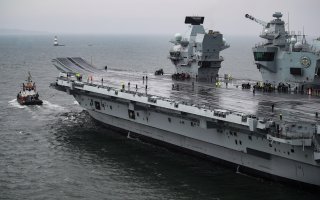History Made: F-35 Tests Completed on Aircraft Carrier HMS Prince of Wales
The Royal Navy has successfully completed its F-35 Lightning II fast jet Development Test Phase 3 (DT3) trials on the aircraft carrier HMS Prince of Wales this week.
The Royal Navy has successfully completed its F-35 Lightning II fast jet Development Test Phase 3 (DT3) trials on the aircraft carrier HMS Prince of Wales this week. The "Senior Service's" newest and largest carrier has been training with U.S. aircraft off America's east coast. The Royal Navy has been working to expand the operating limits of the fifth-generation stealth fighter to develop advanced takeoff and landing techniques, allowing the aircraft to launch with more weapons.
Around 200 American personnel from the Pax River F-35 Integrated Test Force (ITF) embarked on the British warship for up to four weeks of sea trials. The team was able to collect data to enhance the operating capability of the jet with the carrier.
Last month, an American F-35B completed the first shipborne rolling vertical landings (SRVL) on the vessel's flight deck – during which, the aircraft landed on the carrier after approaching the ship from behind at speed, before using thrust from the aircraft's nozzle and lift created by air over the wings to touch down and gently come to a stop.
Previously, the Lightning II had only landed on the warship vertically, where it hovers by the side of the flattop before moving sideways and lowering onto the flight deck. Less than two weeks after reaching that milestone, another F-35B made the world's first night-time SRVL on HMS Prince of Wales, the Royal Navy announced.
The official social media account of HMS Prince of Wales shared a video marking the completion of its DT3 trials on X (formerly Twitter) earlier this week.
Better Late Than Never?
However, DT3 was completed about a year behind schedule as the aircraft carrier broke down near the Isle of Wight last year after leaving Portsmouth to deploy to the U.S.
In late August 2022, the 65,000-ton warship had to be towed to Rosyth, Scotland, for repairs, which reportedly cost the UK taxpayers upwards of £25 million ($30.5 million USD). Both of the propeller shafts needed to be replaced, just a few years after the ship had entered service.
It was the latest setback for the £3bn carrier – the most expensive warship ever built in the UK.
HMS Prince of Wales experienced flooding in May 2020 that caused minor damage – while more significant flooding from a fire control system in October of that same year caused damage to her electrical cabling. The carrier was confined to docks for almost eight months – limiting her time at sea to just 30 days in 2020.
There has been speculation that there may be issues with her sister vessel, HMS Queen Elizabeth, which was forced to cut short her autumn deployment. The Royal Navy's flagship was even spotted returning to Portsmouth Naval Base with F-35B Lightning II aircraft embarked on the carrier remained on her flight deck.
Author Experience and Expertise
Peter Suciu is a Michigan-based writer. He has contributed to more than four dozen magazines, newspapers, and websites with over 3,200 published pieces over a twenty-year career in journalism. He regularly writes about military hardware, firearms history, cybersecurity, politics, and international affairs. Peter is also a Contributing Writer for Forbes and Clearance Jobs. You can follow him on Twitter: @PeterSuciu.
Image: Creative Commons.


